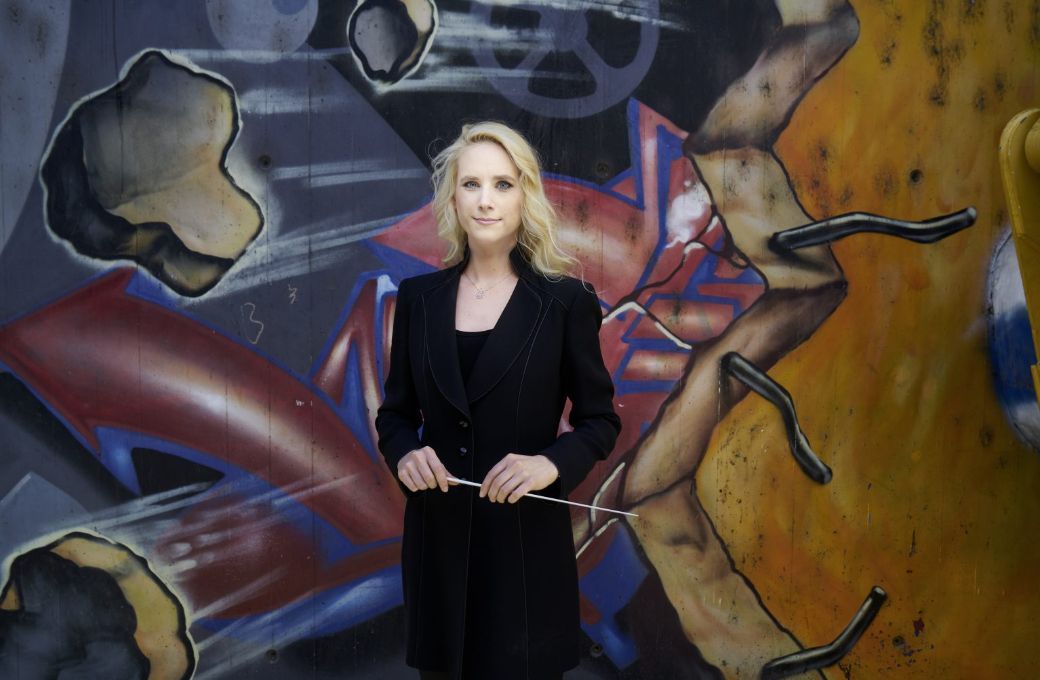If someone invited you to “The Bash”, what would come to mind? A grungy festival in a field, perhaps, a basement full of metal-heads, or another franchise cricket league. Whatever you expected, I doubt it would be a double-bill of concerts at a smart hall in the middle of Switzerland. As artistic director of Andermatt Music, and conductor of the Swiss Orchestra, Lena-Lisa Wüstendörfer will be in charge of proceedings over 25th and 26th October, yet even she isn’t quite sure what to expect – and that’s the way she likes it.

“It will be a laboratory,” she says. Joining Wüstendörfer and her ensemble on the stage of the Andermatt Concert Hall will be the singer Stephan Eicher and the writer Martin Suter, both Swiss cultural celebrities, as well as the pianist Reyn Ouwehand and a banjo duo, the Kruger Brothers, who left their Swiss village to find fame on the American bluegrass scene. So when Wüstendörfer promises “new music which is outside the box”, The Bash should certainly deliver.
A previous, one-off collaboration between Eicher and the Swiss Orchestra was such a success that they were invited to tour it. But Wüstendörfer is more interested in building bridges between artistic worlds and what are usually taken to be separate audiences. What she doesn’t want to create is another crossover project: “Rock and pop bands whose music is accompanied by a symphony orchestra are not really new. In Andermatt, we want The Bash to create something new across genres. We do too much of our thinking in boxes. There is classical, there is folk, there is rock. If you like this one, you cannot like that one. But in the end, we are all telling stories, and we are all talking about emotions. We are all trying to touch an audience.”
Wüstendörfer is used to tackling preconceptions head on, and she evidently enjoys a challenge. She founded the Swiss Orchestra in 2018, as the only such ensemble to tour throughout a country where cultural activity is largely divided by language, between its French, German and Italian-speaking regions. She found she was being invited to conduct guest engagements outside Switzerland, and the promoters would ask her for a piece from her homeland. “Well, there is Arthur Honegger, Frank Martin, Heinz Holliger, but many orchestras are not so fond of playing a piece from the 20th century. I began to wonder: is there no Swiss music from the Classical-Romantic period, or was there no good music? Or is it that no one has taken the trouble to find out? And I came to the conclusion that it was the third answer.”
Accordingly, the Swiss Orchestra does more than talk the talk. It brings musicians together for tours across the course of the season, programming works by Swiss composers from the long-19th century, in Eric Hobsbawm’s term, alongside works from the classical canon. In May and June they were joined by Masato Suzuki as the soloist in a harpsichord concerto by Marguerite Roesgen-Champion, a Genevan contemporary of Wanda Landowska. Before it, they played an overture by the Basel-born August Walter, and then Brahms’ Second Symphony.
On 28th September, the Swiss Orchestra launches its sixth season with Hans Huber’s First Symphony, a big programmatic piece from 1881 in the mould of both Brahms and Liszt, based on the life of that most archetypal Swiss hero, William Tell. In the same concert, Olga Scheps plays Rachmaninov’s Second Piano Concerto. “We could have decided to become a very niche project which speaks to a predefined audience, like new-music festivals. But actually, what we wanted to show is, Swiss composers are not niche. They belong with composers such as Rachmaninov.”
“Swiss Dreams” is an impressive showcase for the Swiss Orchestra’s work in progress, a 2CD set on the Prospero label collecting studio and broadcast recordings of pieces by Édouard Du Puy, Hermann Suter, the splendidly named Franz Xaver Schnyder von Wartensee, and others. “These composers were forgotten, among other things, because Switzerland did not have kings and big courts,” says Wüstendörfer. “It was difficult to earn money solely by composing, because there was no one to hire you as a Hofkapellmeister. It was time to found an orchestra which digs into the archives and brings all these composers back to life.”
So that’s what Wüstendörfer did. She had been captivated by the look and sound of an orchestra from early on. “Each individual instrument sounds beautiful, but together, they produce a sound which they could never achieve alone. That’s what fascinated me and motivated me to become a musician.” She trained as a violinist, but began to pursue conducting studies at the conservatoire in Basel. Becoming assistant to Claudio Abbado, in Lucerne and elsewhere, was “a jump into cold water! I saw him shaping different sounds in the orchestra: really extreme sounds, such pianissimi that no one in the hall dared to breathe. And then he could generate a sound so loud and harsh that you thought it would blow up the hall! And he could do all that with scarcely any words, just gestures and charisma.”
Equally formative was her experience as assistant to Sir Roger Norrington at the Zurich Chamber Orchestra. On the surface, I suggest, these conductors could hardly present more of a contrast. “Yes,” she replies, “but they had something in common – they were always full of curiosity. They were always challenging the score and challenging themselves.” She also had success on the competition circuit, but as she shrewdly points out, “If you win a competition, it doesn’t mean you stay on top for ever. And if you don’t win, it doesn't mean you stay down.”
Away from the Swiss Orchestra, Wüstendörfer won glowing opinions for her conducting of Richard Strauss’s Salome at the Opéra in Metz, in April. Her academic background also includes a comprehensive study of Mahler’s Fourth Symphony in interpretation. She cites the Mahler Chamber Orchestra, founded by Abbado, as a model for the kind of “permanent project orchestra” which she has established in Andermatt with the Swiss Orchestra. The membership is flexible, based around a core of musicians with posts in ensembles across Switzerland, aged around 25-45.
On the border between the German and Italian regions of Switzerland, Andermatt is both geographically well-situated for this coming together of Swiss orchestral talent, and symbolically significant as a cultural bridge in a country of many languages and traditions yet with its own powerful sense of national identity. There is a logic to Wüstendörfer’s dual responsibilities as conductor of the Swiss Orchestra and artistic director for the activity of Andermatt Music, which encompasses far more than symphony concerts. As well as The Bash, the purpose-built hall hosted an annual celebration of Goethe in late August.
Through the rest of the year, the programming is built around three “pillars”, as she calls them. The work of the Swiss Orchestra, in both full-orchestral and chamber formations, is complemented by guest appearances from other Swiss ensembles such as the Zurich Chamber Orchestra, and distinguished guests from farther afield such as the pianist Fazıl Say, the Concertgebouw Chamber Orchestra and the Filarmonica della Scala, from Milan.
No less central to the programming of Andermatt Music is the “Local Roots” series of folk music. “It’s new folk,” explains Wüstendörfer, “the equivalent of contemporary classical music, but in the folk genre. The interesting thing is, folk music is usually played by amateurs. But in Lucerne, there is a conservatoire where you can study for a Masters in folk music. So there are very well trained Swiss folk musicians, who do not only know different styles of folk music, but they also have experience in jazz, in classical music, in eastern European music. They can start to mix these influences, develop them further and compose new material.” This series kicks off on 29th September with the 11-strong, all-female ensemble of Damenwahl (“Ladies’ Choice”), and a programme themed around tales of and by women. Whether through the unique fusion of The Bash, the revival of works like Huber’s “Tell” Symphony, or uptempo tunes on the schwyzerörgeli (a Swiss mini-accordion and essential component of folk ensembles), Wüstendörfer has taken on a mission to bring Swiss musicians together, and introduce them to the rest of the world.
Andermatt Music’s autumn season begins from 28th September. See all upcoming events at Andermatt Music.
This article was sponsored by Andermatt Music.


